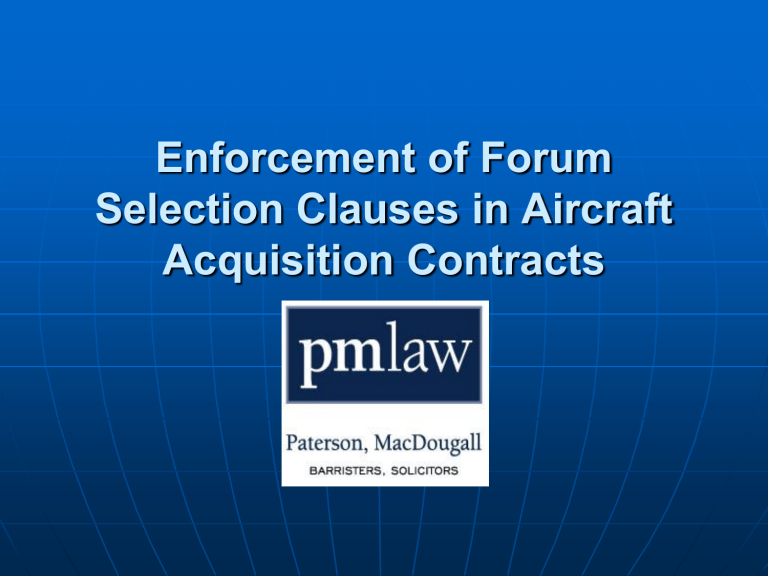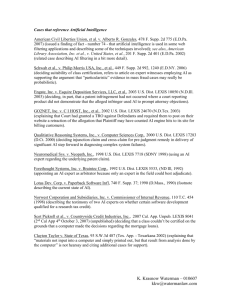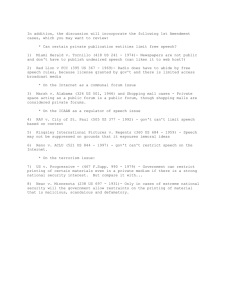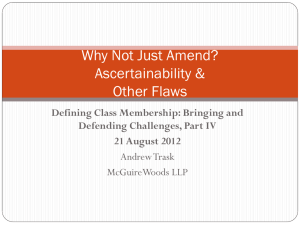Enforcement of Forum Selection Clauses in Aircraft

Enforcement of Forum
Selection Clauses in Aircraft
Acquisition Contracts
Forum Selection Clause
For Example:
“The parties (i) agree that any state or federal court located in Fort Worth, Texas shall have exclusive jurisdiction to hear any suit, action or proceeding arising out of or in connection with this Agreement, and consent and submit to the exclusive jurisdiction of any such court in any such suit, action or proceeding and (ii) hereby waive, and agree not to assert, by way of motion, as a defense, or otherwise, in any such suit, action or proceeding, to the extent permitted by applicable law, that the suit, action or proceeding is brought in an inconvenient forum, that the venue of the suit, action or proceeding is improper, or that this
Agreement or any of the transactions contemplated hereby may not be enforced in or by such courts.”
Trilogy of U.S. Supreme Court
Decisions
The Bremen (1972)
Stewart Organization v. Ricoh (1988)
Carnival Cruise Lines v. Shute (1991)
These decisions not entirely consistent in their approaches
Tension between parties’ right to decide for themselves the venue for dispute resolution, and the public interest in the integrity and fairness of the justice system
The Bremen (1972)
With minor exceptions forum selection clauses should be treated like any other contracts
The Bremen ousted the “Ouster Doctrine”
The Ouster Doctrine: Forum selection clause were void per se because they strip all but the designated court of its inherent jurisdiction to adjudicate a dispute
The Bremen (1972)
Resisting party must clearly show enforcement would be unreasonable and unjust.
Per Chief Justice Burger :“There are compelling reasons why a freely negotiated private international agreement, unaffected by fraud, undue influence, or overweening bargaining power .. should be given full effect.”
Stewart Organization v. Ricoh
(1988)
Forum non conveniens approach
Parties cannot fully control the place of suit with a forum selection clause
Courts retain discretion to set aside contractually valid clauses if “factors other than those that bear solely on the parties private ordering of their affairs weigh against enforcement”
Carnival Cruise v. Shute (1991)
Extends the Bremen to consumer contracts
Emphasized that a clause enforcement motion should turn on the contractual validity of the clause
“It bears emphasis that forum-selection clauses contained in form passage contracts contain are subject to judicial scrutiny for fundamental fairness.”
Recent Aviation Cases
The Bremen approach is overwhelmingly followed.
Clair Aero Inc. v. Tradewinds Mutual Insurance, LLC, 491 F.
Supp. 2d 211; 2007 U.S. Dist. LEXIS 44174
Rolico Aviation Limited v. Mansfield Heliflight, Inc., 2008
U.S. Dist. LEXIS 17171
Hasler Aviation, L.L.C. v. Aircenter, Inc., 2007 U.S. Dist.
LEXIS 63143
Maria Dalva Viera De Olivera Dos Santos v. Bell Helicopter
Textron, Inc., 2009 U.S. Dist. LEXIS 71356
Atlasjet Uluslararasi Havacilik A.S. v. EADS Aeroframe
Services, LLC, 2009 U.S. Dist. LEXIS 17077
Aviation Finance Group, LLC v. Duc Housing Partners, Inc.,
2009 U.S. Dist. LEXIS 38802
Careful What You Wish For
Passenger claimants may use a forum selection clause in an aircraft acquisition contract to assert jurisdiction in the United States where there is otherwise no basis for such jurisdiction
Attempted in the Flash Air accident
(the passengers lost on fnc): 2005
U.S. Dist. LEXIS 18738
Canada
Z.I. Pompey Industrie v. ECU-Line N.V., [2003] 1 S.C.R.
450, 2003 SCC 27
“In the context of international commerce, order and fairness have been achieved at least in part by application of the “strong cause” test. This test rightly imposes the burden on the plaintiff to satisfy the court that there is good reason it should not be bound by the forum selection clause. It is essential that courts give full weight to the desirability of holding contracting parties to their agreements. There is no reason to consider forum selection clauses to be non-responsibility clauses in disguise.”
“In any event, the “strong cause” test provides sufficient leeway for judges to take improper motives into consideration in relevant cases and prevent defendants from relying on forum selection clauses to gain an unfair procedural advantage.”







